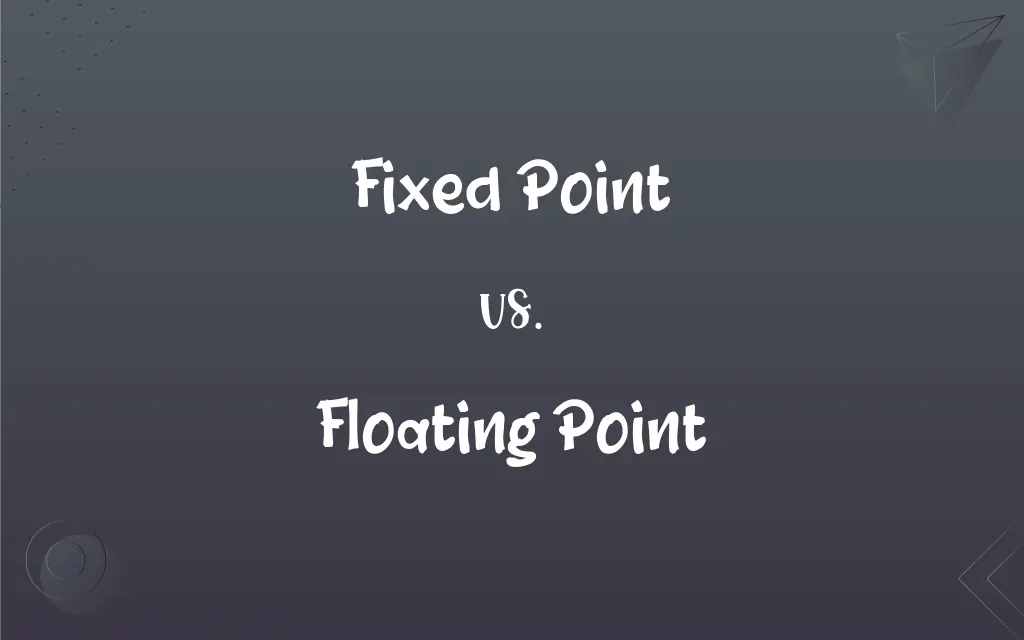Fixed Point vs. Floating Point: What's the Difference?
Edited by Aimie Carlson || By Harlon Moss || Published on January 19, 2024
Fixed point represents numbers with a fixed number of decimal places, while floating point represents numbers with a scalable precision, allowing for a wider range of values.

Key Differences
In fixed point representation, the position of the decimal point is set and doesn't change, limiting the range but increasing precision for small numbers. Floating point representation allows the decimal point to 'float', adapting the precision based on the magnitude of the number.
Fixed point is simpler and faster in operations, beneficial for applications where speed and simplicity are crucial and the range of values is limited. Floating point, however, is more versatile, handling a vast range of values, crucial for scientific computations.
Fixed point arithmetic is less prone to rounding errors in specific cases, making it suitable for financial calculations. Floating point arithmetic, while more flexible, can introduce more rounding errors due to its variable precision.
Fixed point numbers consume less memory compared to floating point numbers, making them ideal for memory-constrained systems. Floating point numbers, though larger, are essential for complex calculations and simulations where range and precision vary.
Fixed point calculations are used in systems where stability and predictability are key, like audio processing. Floating point is preferred in systems requiring large-scale, complex calculations, like 3D graphics rendering.
ADVERTISEMENT
Comparison Chart
Precision
Fixed precision
Scalable precision
Range
Limited range of values
Wide range of values
Complexity
Simpler, faster calculations
More complex, slower calculations
Memory Usage
Less memory consumption
More memory consumption
Suitable Applications
Financial calculations, audio processing
Scientific computations, 3D graphics
ADVERTISEMENT
Fixed Point and Floating Point Definitions
Fixed Point
A numerical representation with a fixed number of digits after the decimal.
The fixed point format is ideal for representing currency.
Floating Point
More flexible but introduces rounding errors.
Floating point arithmetic can lead to small inaccuracies in calculations.
Fixed Point
Used in computing for stable and predictable arithmetic.
Fixed point arithmetic ensures precise audio signal processing.
Floating Point
Requires more computational resources.
High-end computers use floating point for intensive tasks like 3D rendering.
Fixed Point
Reduces rounding errors in certain calculations.
Fixed point numbers are preferred in precise financial calculations.
Floating Point
Adapts precision based on the magnitude of the number.
In floating point, large numbers can be represented with sufficient accuracy.
Fixed Point
Efficient for systems with limited computational resources.
Embedded systems often use fixed point for efficiency.
Floating Point
Essential for calculations with a wide range of values.
Physics simulations rely on floating point for accurate results.
Fixed Point
A simpler alternative to floating point in specific applications.
For basic calculations, fixed point representation suffices.
Floating Point
A numerical representation allowing variable precision.
Floating point numbers are used in complex scientific calculations.
Fixed Point
Of, relating to, or being a method of writing numerical quantities with a predetermined number of digits and with the decimal located at a single unchanging position.
Floating Point
Of, relating to, or being a method of writing numeric quantities with a mantissa representing the value of the digits and a characteristic indicating the power of the number base, such as 3 × 10-5.
Fixed Point
(computing) Being or using an internal number representation with a fixed number of decimal places (as opposed to floating-point).
Floating Point
Alternative form of floating point.
FAQs
Why is fixed point preferred in financial calculations?
Due to its reduced rounding errors and stable precision.
Does floating point require more computational power?
Yes, it generally requires more processing power than fixed point.
Can fixed point handle very large or small numbers?
It's less suited for extremely large or small values due to its fixed precision.
What is fixed point representation in computing?
It's a way to represent numbers with a set number of digits after the decimal.
Where is fixed point commonly used?
In applications requiring stable and predictable calculations, like audio processing.
Is floating point suitable for audio processing?
Fixed point is often preferred for its stability in such applications.
Is fixed point more memory efficient?
Yes, it generally uses less memory than floating point.
Why is floating point used in scientific computations?
For its ability to handle very large and very small numbers accurately.
How does fixed point improve predictability in calculations?
By having a constant precision, it ensures consistent results.
Can fixed point be used in graphic rendering?
Generally, floating point is preferred for its higher precision in such tasks.
Is floating point representation more complex?
Yes, it's more complex due to its variable precision and range.
How do fixed point and floating point differ in memory usage?
Fixed point uses less memory compared to floating point.
Are there rounding errors in floating point calculations?
Yes, due to its variable precision, rounding errors can occur.
Does fixed point offer better performance in specific applications?
Yes, especially in applications where precision and stability are crucial.
Is fixed point still relevant with modern processors?
Yes, in specific applications where its characteristics are advantageous.
What is floating point representation?
A method to represent numbers with scalable precision, allowing for a wide range of values.
Can floating point represent decimal fractions accurately?
Yes, but with some limitations due to its binary basis.
Why might floating point be slower than fixed point?
Due to its complexity and the calculations required to manage precision.
Are fixed point calculations faster in embedded systems?
Yes, they are often faster and more efficient in resource-constrained systems.
Can floating point handle exponential calculations well?
Yes, it's well-suited for calculations involving very large or small exponents.
About Author
Written by
Harlon MossHarlon is a seasoned quality moderator and accomplished content writer for Difference Wiki. An alumnus of the prestigious University of California, he earned his degree in Computer Science. Leveraging his academic background, Harlon brings a meticulous and informed perspective to his work, ensuring content accuracy and excellence.
Edited by
Aimie CarlsonAimie Carlson, holding a master's degree in English literature, is a fervent English language enthusiast. She lends her writing talents to Difference Wiki, a prominent website that specializes in comparisons, offering readers insightful analyses that both captivate and inform.






































































